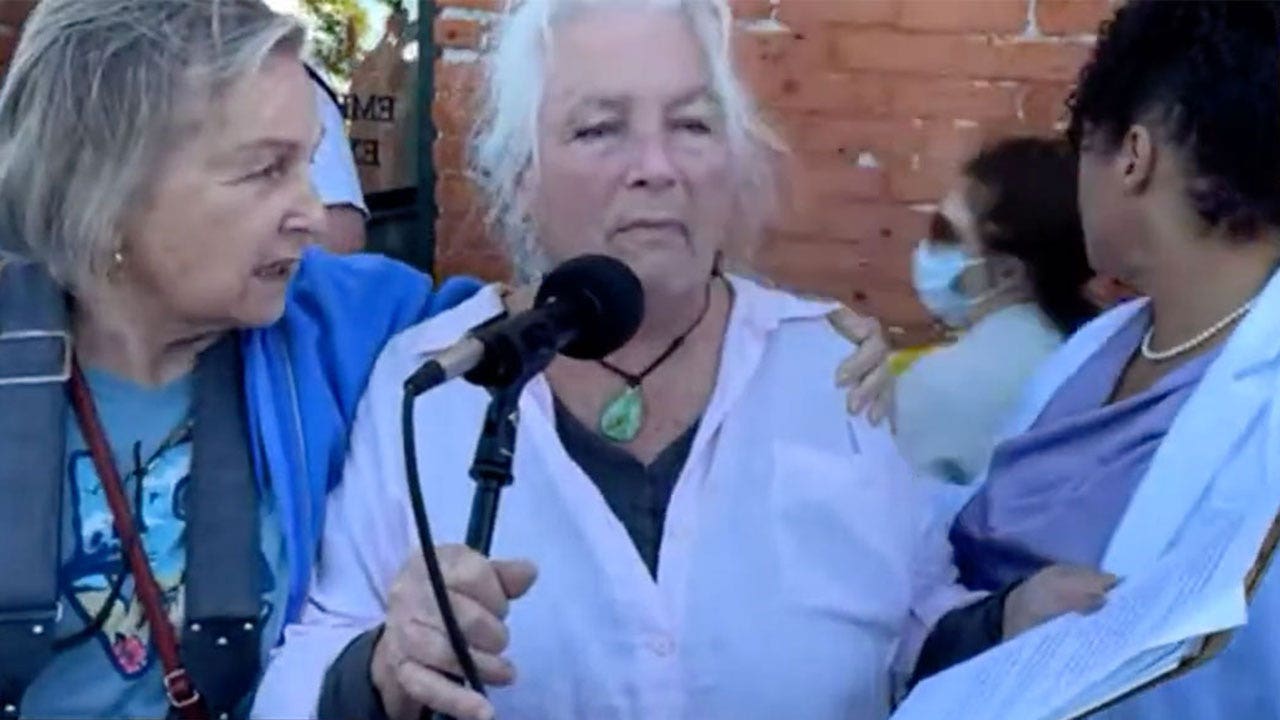NEWYou can now listen to Fox News articles!
I live in the small town of Port Townsend, Washington. We have a community pool, built in the 1960s. There are two dressing areas, one for men and one for women, both with curtained gang showers. Stick figure logos direct men to one side, women to the other. I’ve been swimming there for 40 years, meeting friends, exercising and practicing good pool etiquette — until July 26, 2022.
That day was the beginning of my firsthand experience with the vicious and unforgiving wrath of people who believe in modern gender ideology.
While showering after my weekly swim, I heard a man’s voice. Peering past the billowing curtain, I saw a biological man in a woman’s swimsuit looking at two little girls. I was flabbergasted. My immediate reaction was instinctual and protective. I’m a mother of daughters. I also have experience as an advocate for survivors of domestic violence and sexual assault. I know that men should not be allowed in women-only areas; it’s unsafe and creates potentially traumatizing situations for women and children.
I told the man to leave “right now.” Within seconds, a YMCA staff person appeared. I asked her to get him out. Without any inquiry, she immediately accused me of discrimination, banned me from the pool for the rest of my life, and called the police. Instead of protecting the little girls or trying to understand my concerns, I became the accused. I was the culprit.
Julie Jaman was heckled by trans protesters after objecting to a biological male in a YMCA female locker room. (Credit: Amy E. Sousa)
What I didn’t know at the time was that our community pool, managed by the local YMCA, now has a policy that allows men who identify as women to use the women-only dressing/shower room. The YMCA didn’t publicize this new policy, change the signage, or warn women that men are now allowed into this once-private space.
I felt strongly that people needed to know about this policy. I made a sign, “men who identify as women are using the women’s dressing/shower room,” and picketed outside the public pool for two days. My intent was to let unsuspecting women and parents know this was happening, hoping other swimmers would speak up. Instead, crowds of people opposing my concerns gathered to accost and demean me. I felt unsafe, so I quit picketing.
I decided to go to a City Council meeting to tell my story and ask the council to inform the community about mixing men and women in the same dressing area. I suggested that they provide staff with training on how to handle this extreme cultural shift, that they put up signage to alert people, and that they provide patrons with choices. The chamber was unusually crowded that evening; many transgender believers spoke along with some very wise community members. The mayor allowed commenting to continue for two hours.
But I felt I had to keep advocating for women. On August 15, 2022, I spoke at a press conference across from city hall to protest the pool policy, the failure to respect women’s right to privacy and safety. It was a small gathering, but as we spoke, hundreds of transgender advocates closed in on us, screaming, pushing, knocking people down. They tried to steal signs and the PA system. Bicyclists riding way too close knocked into me and others.
Across the street, several police officers stood by, watching. We called for help. It was almost an hour before local authorities responded to the attacks. And while this was happening outside city hall, the council, inside, passed a proclamation. Using data from unverified studies, they declared the town’s support for transgender people.
Thus began my education about the 21st-century phenomenon of transgender ideology. I was faulted as disrespectful for not using rejiggered pronouns. I learned the Washington State Human Rights Commission had adopted changes in the definition of sex, scrambling it with gender, facilitating new laws and policies that sound so right — diversity, equity, inclusion (DEI) — but harbor dark outcomes.
Laws and policies are now worded to allow confabulation in our cultural practices, mores and biological sciences. What to me appeared to be a fad — lingo and costuming — is, in fact, big business.
Kids are now taught DEI ideas, pseudo-biology and nonsensical pronouns in early grades. Women who protest the loss of their civil rights to privacy and safety are subjected to all manner of humiliation, their right to speak muzzled.
Across the street, several police officers stood by, watching. We called for help. It was almost an hour before local authorities responded to the attacks. And while this was happening outside city hall, the council, inside, passed a proclamation. Using data from unverified studies, they declared the town’s support for transgender people.
I was harassed and maligned for weeks in the local newspapers and on social media. There was a collective hysteria in the community. If this had been the 17th century, I would likely have been burned at the stake.
We, our grandmothers, and those who came before us had to battle to the point of torture, imprisonment and death to gain our rights as women — right to safety and equality, to ownership, to vote, to hold office.
Make no mistake, those rights have been usurped. Gone is the English grammar of our culture and laws based on biology and science. Gone are privacy and safety in public facilities; we’ve lost parental rights; women’s careers as top athletes abolished. And it’s all by the most astonishing cultural and legal phenomenon our society has ever experienced.
I am exiled from the community pool for the rest of my life — but what of the lives of the women to come?
